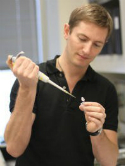The ATM signaling cascade promotes recombination-dependent pachytene arrest in mouse spermatocytes Journal Article
| Authors: | Pacheco, S.; Marcet-Ortega, M.; Lange, J.; Jasin, M.; Keeney, S.; Roig, I. |
| Article Title: | The ATM signaling cascade promotes recombination-dependent pachytene arrest in mouse spermatocytes |
| Abstract: | Most mutations that compromise meiotic recombination or synapsis in mouse spermatocytes result in arrest and apoptosis at the pachytene stage of the first meiotic prophase. Two main mechanisms are thought to trigger arrest: one independent of the double-strand breaks (DSBs) that initiate meiotic recombination, and another activated by persistent recombination intermediates. Mechanisms underlying the recombination-dependent arrest response are not well understood, so we sought to identify factors involved by examining mutants deficient for TRIP13, a conserved AAA+ ATPase required for the completion of meiotic DSB repair. We find that spermatocytes with a hypomorphic Trip13 mutation (Trip13mod/mod) arrest with features characteristic of early pachynema in wild type, namely, fully synapsed chromosomes without incorporation of the histone variant H1t into chromatin. These cells then undergo apoptosis, possibly in response to the arrest or in response to a defect in sex body formation. However, TRIP13-deficient cells that additionally lack the DSB-responsive kinase ATM progress further, reaching an H1t-positive stage (i.e., similar to mid/late pachynema in wild type) despite the presence of unrepaired DSBs. TRIP13-deficient spermatocytes also progress to an H1t-positive stage if ATM activity is attenuated by hypomorphic mutations in Mre11 or Nbs1 or by elimination of the ATM-effector kinase CHK2. These mutant backgrounds nonetheless experience an apoptotic block to further spermatogenic progression, most likely caused by failure to form a sex body. DSB numbers are elevated in Mre11 and Nbs1 hypomorphs but not Chk2 mutants, thus delineating genetic requirements for the ATM-dependent negative feedback loop that regulates DSB numbers. The findings demonstrate for the first time that ATM-dependent signaling enforces the normal pachytene response to persistent recombination intermediates. Our work supports the conclusion that recombination defects trigger spermatocyte arrest via pathways than are genetically distinct from sex body failure-promoted apoptosis and confirm that the latter can function even when recombination-dependent arrest is inoperative. Implications of these findings for understanding the complex relationships between spermatocyte arrest and apoptosis are discussed. © 2015 Pacheco et al. |
| Keywords: | controlled study; unclassified drug; gene mutation; nonhuman; animal cell; mouse; pachytene; spermatocyte; mre11 protein; rad50 protein; animal tissue; apoptosis; nibrin; atm protein; double stranded dna break; checkpoint kinase 2; negative feedback; adenosine triphosphatase; synapsis; trip13 protein; meiotic recombination; spermatogenesis; testis size; epistasis; seminiferous tubule; histone h1; histone h1t; male; article; recombination dependent pachytene arrest; sex body formation |
| Journal Title: | PLoS Genetics |
| Volume: | 11 |
| Issue: | 3 |
| ISSN: | 1553-7390 |
| Publisher: | Public Library of Science |
| Date Published: | 2015-03-13 |
| Start Page: | e1005017 |
| Language: | English |
| DOI: | 10.1371/journal.pgen.1005017 |
| PROVIDER: | scopus |
| PMCID: | PMC4358828 |
| PUBMED: | 25768017 |
| DOI/URL: | |
| Notes: | Export Date: 4 May 2015 -- Source: Scopus |
Altmetric
Citation Impact
BMJ Impact Analytics
Related MSK Work






